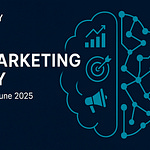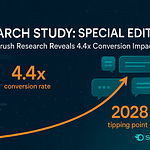Yesterday's news revealed a marketing industry in flux: AI is reshaping job roles, Google's latest updates are redefining what ranks, and marketers are drowning in more data than ever. Staying ahead now means mastering AI tools, adapting to Google's evolving ecosystem, and turning raw data into real insights.
Story #1: AI's Impact on Marketing Jobs—Adapt or Be Automated
Publication: Solutions Review
Date: 24 April 2025
Summary: AI is rapidly transforming marketing job roles, with automation streamlining data analysis, content creation, and customer management. While some positions face obsolescence, new AI-centric roles—like prompt engineers and algorithmic targeting specialists—are emerging. HubSpot data shows 86% of marketers save an hour or more daily thanks to AI, and 68% report positive ROI from AI investments.
URL: https://solutionsreview.com/marketing-automation/what-will-the-ai-impact-on-marketing-jobs-look-like/
What Happened: AI has shifted the marketing workforce, automating repetitive tasks and creating demand for new, specialised skills.
Why It Matters: Marketers must adapt by upskilling in AI literacy and focusing on high-value, strategic work that AI cannot replace.
Suggested Actions:
Identify tasks in your workflow that can be automated with AI.
Invest in AI training and develop expertise in emerging marketing technologies.
Story #2: Google's April 2025 Algorithm—Gemini 2.0 and AI Mode Change the Game
Publication: IMMWIT
Date: 24 April 2025
Summary: Google's latest algorithm update introduces Gemini 2.0 for AI-powered Overviews and launches "AI Mode"—a chatbot-like search experience. This has led to more zero-click searches, a shift from pure SEO to usefulness, and a focus on content with clear structure, author info, and real-world value.
URL: https://www.immwit.com/news/google-algorithm-update-april-2025/
What Happened: AI-generated Overviews now answer many queries directly, reducing clicks to traditional results. Google's new AI Mode further changes how content is surfaced and engaged with.
Why It Matters: Even high-ranking pages may see less traffic if they don't add value beyond Google's AI summaries. Content must now demonstrate expertise, originality, and user trust signals.
Suggested Actions:
Audit your site for unique content that offers value beyond AI-generated summaries.
Enhance trust signals: add clear author info, cite reputable sources, and use up-to-date data.
Story #3: Marketers Are Using 230% More Data—But Struggle to Make Sense of It
Publication: Supermetrics
Date: 24 April 2025
Summary: Marketers are querying 230% more data than in 2020, but 56% say they lack the time to analyse it, and 38% lack the right tools for integration and reporting. Only 14% cite lack of data expertise as a barrier, suggesting the real challenge is turning data into actionable insights.
URL: https://supermetrics.com/blog/marketing-data-report-2025
What Happened: Data volumes have exploded, but many teams are overwhelmed, with too little time or integration capability to extract value.
Why It Matters: More data doesn't equal better marketing—without the right analytics and clarity, teams risk drowning in information and missing opportunities. This is particularly relevant as companies expand their martech stacks and collect more customer touchpoint data across channels.
Suggested Actions:
Streamline your analytics stack to focus on actionable KPIs.
Implement automation for reporting and data integration to free up time for analysis.
Consider custom dashboard solutions that merge data sources for clearer insights.
Story #4: Google Play System Updates—New Features for Marketers and Users
Publication: SammyGuru
Date: 23 April 2025
Summary: Google Play's April updates improve device connectivity, battery life, and privacy, and add features like app video previews and opt-in promotional notifications. Marketers can now leverage richer app previews and more direct notification channels to engage users.
URL: https://sammyguru.com/april-2025-google-play-system-updates-whats-new/
What Happened: Google Play Store and Services updates bring new marketing touchpoints and improved user experiences.
Why It Matters: Marketers should optimise app listings with engaging video content and leverage new notification features to boost discovery and engagement.
Suggested Actions:
Update app store listings with high-quality video previews.
Use promotional notifications to increase user retention and app engagement.
Comprehensive Summary
The marketing world on 24 April 2025 is defined by transformation and adaptation. AI's impact is most visible in the workforce: automation is streamlining data analysis, content creation, and customer management, freeing marketers for more strategic roles while creating demand for new AI-centric positions. HubSpot's recent data shows that 86% of marketers now save over an hour daily with AI, and nearly 70% report positive ROI—evidence that AI is a productivity engine, not just a trend.
Meanwhile, Google's algorithm changes, powered by Gemini 2.0 and AI Mode, are fundamentally altering the search landscape. AI-generated Overviews now answer many user queries directly, reducing the importance of traditional rankings and making it essential for content to deliver unique, actionable value and visible trust signals. Marketers must rethink SEO strategies, focusing on expertise, originality, and user engagement.
The data management challenge highlighted by Supermetrics is particularly significant. The 230% increase in data queries since 2020 reflects how marketers are collecting more information than ever before, but most teams struggle to turn this flood into actionable insights. The bottleneck isn't data expertise; it's time constraints and integration challenges—meaning marketers must streamline analytics and automate reporting to extract value. Companies that can effectively integrate data sources, automate routine analysis, and focus on high-impact metrics will gain significant competitive advantage.
Finally, Google Play's latest updates expand marketers' toolkit with richer app previews and new notification channels, offering fresh opportunities for mobile engagement.
In this environment, agility, upskilling, and a focus on value creation are the keys to thriving.
Key Takeaways
Upskill for AI: Marketing roles are evolving—AI literacy and strategic thinking are now essential for career growth.
Content Must Stand Out: Google's AI-powered search rewards unique, expert, and trustworthy content over generic or repetitive information.
Simplify Your Data: Focus on actionable KPIs and automate reporting to avoid drowning in data—this is increasingly critical as data volumes continue to expand.
Adopt the Right Tools: Regularly review and pilot new AI tools to keep your marketing stack competitive.
Optimise for New Touchpoints: Use Google Play's new features to enhance app discoverability and engagement.
How-To Spotlight: Building Your AI-Driven Marketing Stack
Step 1: Audit your current marketing processes and identify repetitive or time-consuming tasks.
Step 2: Select AI tools that address these bottlenecks—particularly those that can help centralize and interpret data.
Step 3: Integrate tools with your analytics and reporting platforms to streamline data flows.
Step 4: Train your team on AI best practices and regularly review tool effectiveness.
Step 5: Monitor performance and iterate, focusing on KPIs that directly impact business outcomes.
Subscribe to our daily updates: Indexify Substack
Listen to our podcast: Indexify Podcast














Share this post